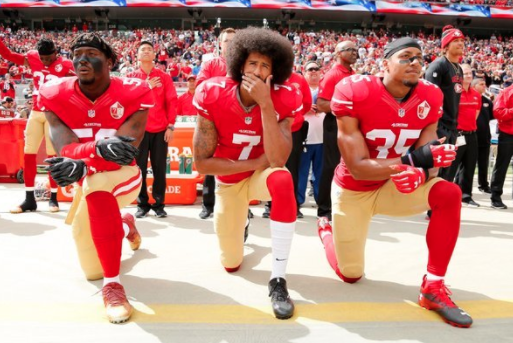A few weeks ago, my girlfriend and I took our semi-regular road trip to visit an acupuncturist whose office is, as the young people say, in the cut–and worth the drive. Because all road trips need a good podcast, I scrolled through the recent episodes of our favorite shows. The Moth? This American Life? Nah, not today. I wasn’t really in the mood for Ira Glass or coffee-shop story-telling. Racism was, as it usually is, heavy on my mind. We were living through the white supremacist uproar surrounding Colin Kaepernick’s protest against systemic racism and police violence targeting communities of color. And instead of attending to the unfolding disaster in Puerto Rico, the president was being the racist asshat that he is. In the midst of this bullshit, I naturally thought of Heben Nigatu and Tracy Clayton’s hilarious, thought-provoking and all around brilliant podcast Another Round. I found a recent episode featuring Senator Cory Booker, linked the Bluetooth and happily reclined my passenger seat.
The interview was certainly engrossing. Heben and Tracy peppered their back and forth with the relevant pop culture references, incisive questions and unmistakable shade that keep fans like me coming back for more. But as I listened to Booker, I alternated between curiosity, side-eye, sympathy and revulsion. The Senator is a masterful politician and accomplished manipulator, for sure. Despite my knowledge of his shady record, various corruption scandals and contentious relationship with progressives, I was nonetheless interested in hearing how Booker would interact with Heben and Tracey and what, if anything, he might say about racism.
Politicians are never more dangerous and toxic than when they mix just enough truth with their lies to sound authentic. Even with all of my critique and side-eye, Booker’s emotion-laden talk about his “hope for America” brought tears to my eyes. But even as I teared up, I realized the horror of what Booker had done. Weaving together what seemed to be compelling stories of black pain, Booker was able to emotionally manipulate me (and others) as he weaponized black suffering to portray himself as “woke”.
What unfolded over the course of the episode was a brilliantly jarring tight-rope performance. With aplomb, passion and humor, Senator Booker was able to both acknowledge what he called the “horrible system” upon which the US is based–and also minimize its crimes. Walking that white supremacist tight-rope, he granted just enough acknowledgement of the United States’ ongoing history of racial and class oppression to sound socially conscious to gullible ears while, in the same breath, insisting the US is still a “great country” despite the crimes it perpetuates against its own citizens. Not to mention — and indeed, Booker did not mention — the crimes perpetuated by the US against millions of human beings abroad.
After expressing his grave concern for mass incarceration, Booker unironically (!!!!) quoted Bill Clinton:
There’s nothing bad about America that can’t be solved by what’s good about America.
I get it. Cory Booker is a politician and politicians lie. They especially lie in ways that flatter themselves and keep them in office. But the lie at the heart of Booker’s formulation is that a fundamentally broken and oppressive system can always be redeemed, no matter how many centuries of crimes against humanity it commits. The fact that Booker borrowed a quote from one of the architects of mass incarceration–a policy which helps maintain white supremacy–after claiming to care about systemic racism tells you all you have to know about the convoluted lengths to which some politicians will go to distort social reality, cater to powerful white elites and simultaneously line their pockets.
And this is why that buttery falsetto came to mind: Never too much, never too much, never too much . . .
No matter how horrific the systemic crimes..
No matter how many millions slaughtered, discriminated, left without water..
No matter how many innocent people incarcerated by the state..
No matter how many colored and colonized people abandoned..
No matter how many children killed by police..
No matter how many miscarriages of justice..
No matter how many under-resourced schools..
No matter how many generations of environmental racism..
No matter how many capitalist-produced humanitarian crises..
No matter.
The suffering is never, never too much.
In effect, the function of a politician like Cory Booker is to swoop in, invoke Bill Clinton, and reassure the citizenry that we are a “great country”. The “original sin” is damnable, but never quite damning enough to curtail the possibility of absolution. The body count can never be too high, the death toll never too devastating. The evils of the “horrible system” can be washed away, again and again, with the redemptive baptism of Cory Booker’s Wall-Street-and-Big-Pharma-funded discourse.
The sad reality is that our politics are dominated by two contemptible forces: those who completely deny that the US commits any crimes at all and those who admit some of the crimes but perpetually excuse and minimize them with the language of “forgiveness”, “hope” and “love of country”. Both of these forces are two sides of the same coin: the propaganda needed to justify and prolong US exceptionalism and dominance.
I’m sorry to say that for these forces, there is no bottom. There is only a bottomless pit into which marginalized people can be shoveled, shuttered and shrugged off. Whole populations can be slaughtered, left to die or slowly disintegrate, without resources, without power, without fresh water, without adequate schools, deprived of basic dignity and human rights . . . and the patriotic propaganda continues, unperturbed.
No atrocity left behind.
All the moral and structural wrongs can be “solved” and “fixed” by what’s “good about us”. It’s the neoliberal mantra. The death march song.
There is something very telling and horrific about the political discourse coming even from those brave souls who, following the lead of Colin Kaepernick, decide to take a knee. You will notice how in almost every case, citizens feel compelled to justify their protest in patriotic terms. This is, of course, the compulsory performance of patriotic devotion (“No disrespect to the flag!” “I love this great country!”).




